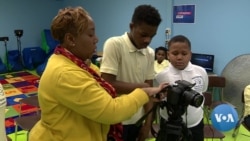A dozen elementary school students from a poor neighborhood in Baltimore, Maryland, are becoming filmmakers. Today, they are busy tossing around ideas and getting ready to answer each other’s questions on camera.
They meet three times a week with filmmaker Vonnya Pettigrew, founder of Root Branch Productions and Film Academy. By the end of the school year, they've created a video project.
“Our goal is to move young people from a content consumer to a content creator,” Pettigrew said. So, she teaches them about composition, framing and writing. The kids learn how to set up lights, use a camera and record audio.
In the process, these kids learn important life skills, such as communication, teamwork, and even public speaking.
“We find a value in teaching documentary style because, as I simply put it, documentaries are real people talking about real issues,” Pettigrew explained. “So, this is an opportunity for them to have as a young person to exercise your voice, to be able to advocate for themselves and for their peers and for their families and communities about things that are really important to them.”
Speaking truth
The group’s first project two years ago was a documentary called "Youth Truth," highlighting the students' neighborhood and what they'd like to see changed there.
In the early stages of creating the documentary, the kids discussed what they didn't like — bullies and violence, and drug dealers on the street. They didn't like the relationship between police officers and youth in their neighborhood. They felt those problems needed attention and wanted to talk about them. The documentary allowed them to do so.
Pettigrew said when she posted that video on her social media sites, she got a message from the Baltimore Police Department.
“They said to me they were preparing for a youth summit and asked my permission to play the video at the launch of the youth summit to kind of springboard the conversation around how young people feel about the relationship with the city police.”
"Youth Truth" was also screened at the youth segment of the Maryland Film Festival in Baltimore. It won the Audience Choice Award at the Born in Baltimore Film Festival.
Last year, the class produced a music video about standardized testing, which has become a controversial way to measure student and teacher success. They recorded the song “i-Ready” in a professional recording studio. It became an instant hit, as Baltimore City public schools played it in classrooms around the city.
Flourishing talents
The lyrics were written by Kimberly Hill Miller, principal of Lockerman Bundy Elementary School. She supports filmmaking education in every possible way, including turning one of the classrooms into a permanent TV studio. She wanted to incorporate some of the 21st century skills the children need so they can be prepared for college and careers, and give them more opportunities to use these speaking and listening skills.
Miller has observed that the filmmaking curriculum has helped them to do better in class.
“They learn how to follow directions, how to brainstorm ideas, read, write and speak,” she said. “I’m noticing that students are able to communicate better than they did prior to the program. They are participating. They are showing respect to one another. Giving each other eye contact when they are engaged in discussions in class, as well.”
Nine-year-old Demor’ee Crawford said since she joined the class two years ago, she's become more assertive, overcame her shyness and learned to be a good team player.
“Now, I love working with new people. I love this program, I really love it.”
So does Daion Crews Harris, a 10-year-old 5th grader. He finds the art of filmmaking intriguing and says the program has helped him explore it.
“It prepares us for a lot of things, and it teaches us other things,” he said. “You could do a lot of other things if you try them. It mostly gives me confidence.”
Confidence, teamwork and creativity — skills that will help these kids become filmmakers or anything else they dream of becoming.






